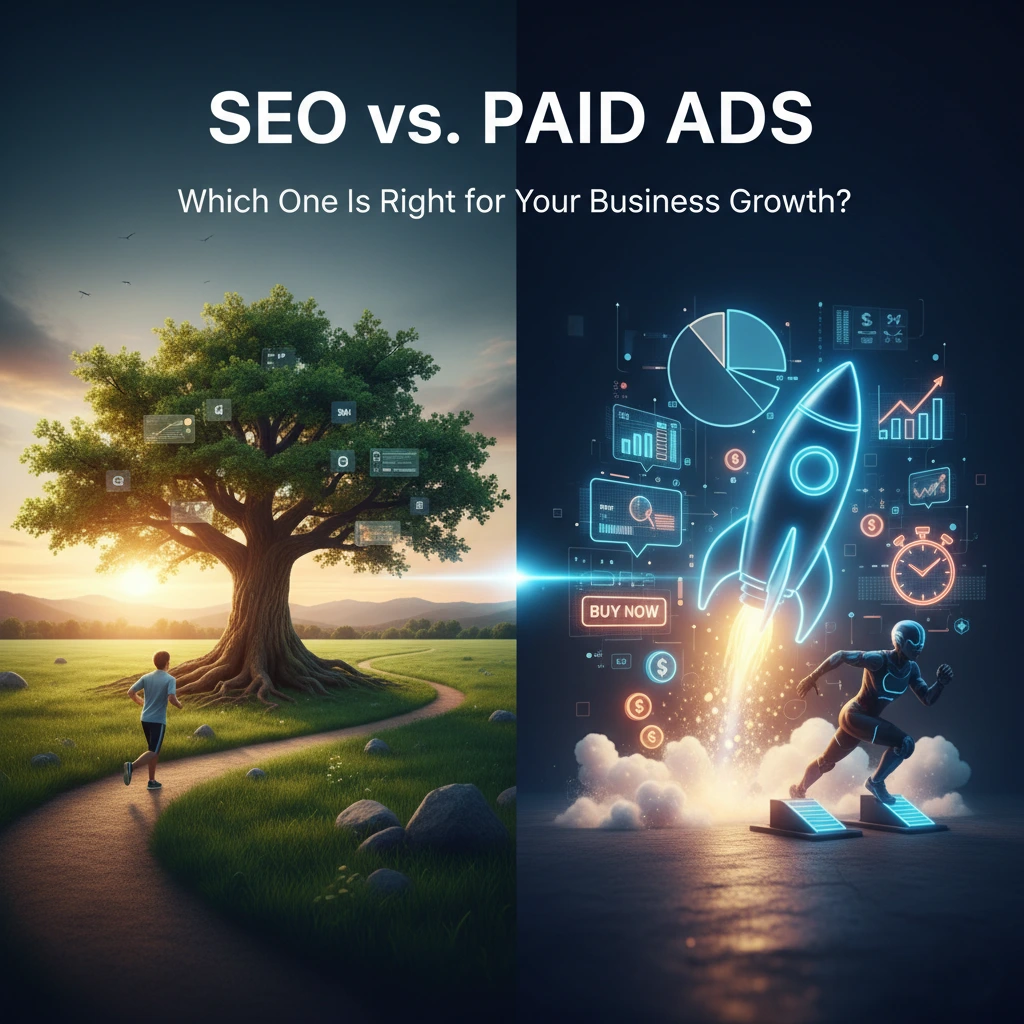Author
AdminDate
January 8, 2026Category
SEO
Description
SEO vs. Paid Ads: Which One Is Right for Your Business Growth?
You've established an amazing business, your product is great, and your service is unparalleled. But there's one important question that every contemporary business owner must answer: "How do I get noticed online?" In the big digital marketplace, visibility is money. At its core, two behemoth strategies arise to win that visibility and achieve business growth online: Search Engine Optimization (SEO) and Paid Advertising (such as Pay-Per-Click or PPC).
This tends to reignite the final digital marketing showdown: SEO or Paid Ads.
Most view them as competitors, opting for one or the other. But this is more complex than that. View them more as two pieces of different equipment on your squad as part of your overall digital marketing strategy. SEO is your distance runner, gaining stamina and sustained strength. Paid Ads are your sprinter, designed for explosive, instant velocity.
So, who do you place on the field? Let's dissect it to make the decision easier.
The Marathon Runner: SEO (Search Engine Optimization)
SEO is the natural process of optimizing your site and content so that they appear more prominently on search engine results pages (SERPs) such as Google for a better organic ranking. You don't pay for the click when you rank organically; you've earned that position based on quality, authority, and relevance.
How it works: SEO is a multi-pronged practice involving:
On-Page SEO: Developing high-quality, relevant copy organized around targeted keywords your audience is looking for. This encompasses optimizing titles, meta descriptions, and headers as part of your on-page SEO.
Off-Page SEO: Building trust and authority, largely by acquiring high-quality backlinks from other trustful websites as a key part of off-page SEO.
Technical SEO: Having your website's backend organized for search engine crawlers. This includes site speed, mobile-friendliness, and site architecture, all crucial for technical SEO.
The Advantages of SEO:
Credibility and Trust: People naturally trust organic results more than advertisements. A first-page organic ranking is a strong third-party seal of approval from Google itself.
Sustainable, Compounding Results: SEO is a one-time investment. The efforts you put today compound on themselves. A well-ranked page can drive traffic and leads for years, creating a snowball effect of visibility and authority, highlighting the benefits of SEO.
Higher Click-Through Rate (CTR): On average, the #1 organic result on Google receives a much higher CTR than the top sponsored ad.
Cost-Effective at Scale: Although SEO initially takes time and resources, there is no direct fee for clicks. Once you are ranked, every click amounts to virtually nothing, resulting in a much lower long-term cost-per-acquisition, making it a cost-effective marketing solution.
The Cons of SEO
Time-Consuming: SEO isn't a quick fix. It may take months (typically 6-12) to gain substantial traction, particularly in highly competitive verticals. This answers the common question of "how long does SEO take to show results?"
No Guarantees: You're at the mercy of Google's constantly shifting algorithms and frequent Google algorithm updates. What's working today may need adjustment tomorrow.
Needs Expertise: Successful SEO is nuanced and involves ongoing learning to keep up with algorithm changes and best practices for building online authority.
The Sprinter: Demystifying Paid Ads (PPC/SEM)
Paid Ads, more popularly referred to as Pay-Per-Click (PPC), is an internet marketing model where you pay a cost-per-click (CPC) whenever one of your ads gets clicked. The most popular example is Google Ads, where you get to bid on your ad appearing at the top of the search engine results for particular keywords.
How it works: You make campaigns for certain keywords, demographics, locations, and interests. You input a budget and bid on ads against other advertisers. When a user searches for something that matches your keywords, your ad can appear as part of your Google Ads strategy.
The Pros of Paid Ads:
Immediate Results: This is the largest benefit. You can run a campaign and begin getting traffic and leads in a matter of hours, providing immediate marketing results.
Hyper-Targeting: Paid channels have amazing targeting features. You can reach users based on where they are, how old they are, what they like, what they've done online, and more, all part of hyper-targeting ads.
Total Control & Flexibility: You control your budget, ad copy, and who gets to see your ad. You can completely turn campaigns on or off, making it ideal for promotions or A/B testing.
Highly Trackable ROI: Each click, conversion, and dollar spent can be followed carefully. It's simple to compute your Return on Investment (ROI) and make campaign optimizations based on performance for a measurable ROI.
The Disadvantages of Paid Advertising:
Cost: It's pay-to-play. The cost-per-click (CPC) may be extremely high in competitive industries. Your budget may be exhausted rapidly without proper care and ad spend management.
It Stops When You Stop: The instant you switch off your ad budget, your visibility vanishes. Unlike SEO, it creates no long-term asset. This is a key difference in the SEO vs. PPC debate.
"Ad Blindness": Most intelligent internet users have become "ad blind" and deliberately skip sponsored listings to click on organic results.
Head-to-Head: A Quick Comparison
| Feature | SEO (The Marathon Runner) | Paid Ads (The Sprinter) |
|---|---|---|
| Speed of Results | Slow (months) | Fast (hours/days) |
| Cost | Initial investment of time/resources | Pay-per-click/impression cost |
| Longevity | Long-term compounding returns | Short-term, disappears when payment ceases |
| Trust & Credibility | High | Lower (users are aware it's an ad) |
| Targeting | Broad (search intent) | Hyper-specific (demographics, etc.) |
| ROI | More difficult to measure at first, but can be staggering in the long run | Immediately and directly measurable |
The Final Verdict: Which is Better for my Business, SEO or PPC?
The correct response isn't "one is better than the other." The exact response relies solely on your business objectives, timeline, and budget when choosing a marketing strategy.
You should prioritize SEO if:
You are establishing a long-term brand and wish to build authority.
You have a limited budget but can invest sweat equity or outsource to an expert in the long term.
Your business model is content-dependent and establishing a trusted resource (e.g., blogs, consulting, professional services).
You wish to build a worthwhile, long-term digital asset that appreciates.
You should prioritize Paid Ads if:
You must get leads or sales right away.
You are introducing a new product, conducting a time-limited promotion, or experimenting with a new market, like with retargeting campaigns.
You have a dedicated budget and need to accurately measure your marketing ROI.
Your website is brand-new and has no organic authority.
The Power Move: Using SEO and PPC Working Together
Here's the trick the professionals know: The strongest digital marketing approach doesn't decide between SEO and Paid Ads; it combines them into an integrated digital marketing plan.
They are a force multiplier used in conjunction with each other:
Inform Your SEO with PPC Data: Employ a PPC campaign as a way to rapidly test which keywords convert most effectively. After you've identified your money-makers, you can double down on an SEO long-game strategy to rank for them naturally, using PPC data for SEO.
Own the SERP: With both top paid ad and #1 organic listing, you own the search page, dominating the visibility and credibility of your brand. This helps you dominate the SERP.
Strategic Retargeting: Bring visitors in with valuable content using SEO. Then, keep them top-of-mind using paid retargeting ads and bring them back to convert.
Ultimately, the Paid Ads vs. SEO debate is a false dichotomy. It's not a matter of which one, but a matter of when and how to employ each to create a well-rounded, robust, and growth-focused digital strategy.
So, consider your business objectives. Do you require a sprint or a marathon? The best response may be both.
Insight
Access Our Comprehensive Others Blog Archive

How AI is Transforming Web Development & Design
The revolution is here. Artificial Intelligence is no longer just a buzzword; it's a practical tool that's fundamentally changing web development and design. From AI "pair programmers" that write code to design tools that creat...

SEO vs. Paid Ads: Which One Is Right for Your Business Growth?
It's the ultimate digital marketing showdown: SEO vs. Paid Ads. One builds long-term authority like a marathon runner, while the other delivers immediate results like a sprinter. But which one should you be spending your budget...
.png)
Is Your Business Invisible Online? How to Build a Powerful Digital Presence in 2026
In today's digital-first world, a strong online presence for your business isn't optional—it's essential. Learn the 5 key pillars of digital marketing, from SEO to social media, to increase your visibility, attract customers,...